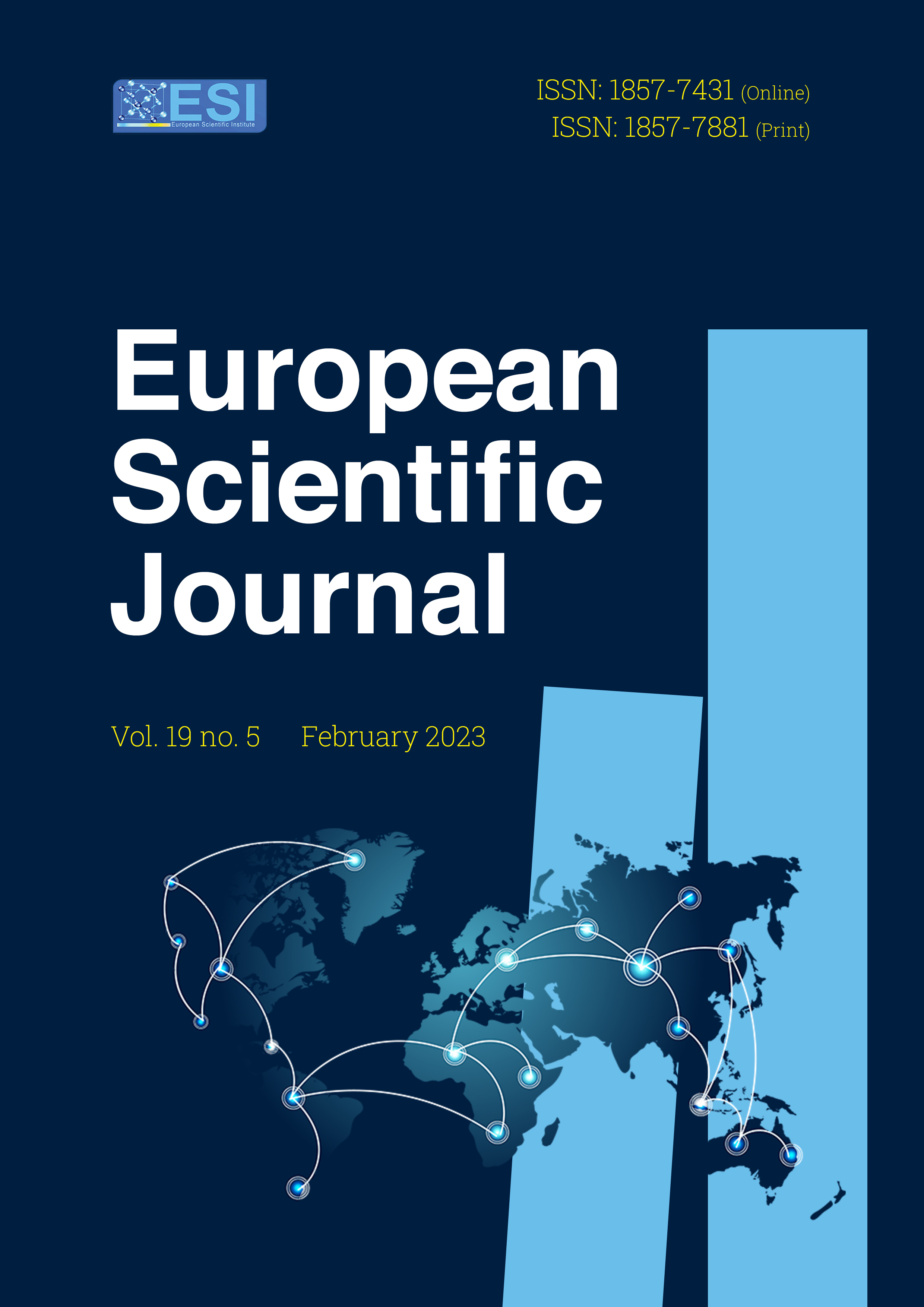Analysis of the Degree of Satisfaction with Life Before and During the COVID-19 Pandemic in University Teachers
Abstract
This paper focuses on analyzing the degree of satisfaction with the life of university teachers before and during the COVID-19 pandemic in the context of social isolation. The present study adopts a quantitative and cross-sectional approach. The sample included 129 university professors, between 18 and 74 years, from the Faculty of Physical Culture Sciences of the Autonomous University of Chihuahua. Satisfaction with Life Scale (SWLS) was obtained to measure the degree of teacher satisfaction (Atienza et al., 2000; Diener et al., 1985; Pons et al., 2002). The results globally showed significant differences between life satisfaction before and during the pandemic according to the means comparison test, using the T-test for related samples, with values of 4.06 before and 3.6 during the pandemic. When categorizing the results according to the escalation, it was shown that 55.7% of the teachers perceived themselves as satisfied before the pandemic, while the opposite happened during the isolation, decreasing, with only 45.5% feeling satisfied. Only 27% felt very satisfied before, and this percentage decreased to only 14.5% during isolation. The COVID-19 not only wreaked havoc on health, but it also had a negative effects on people's psychological, emotional, and social spheres, thereby modifying healthy lifestyles and leaving possible effects on physical and mental health as a consequence.
Downloads
PlumX Statistics
References
2. Atienza, F. L., Pons, D., Balaguer, I. & Garcia-Merita, M. L. (2000). Propiedades psicométricas de la Escala de Satisfacción con la Vida en adolescentes. Psicothema, 12(2), 331-336.
3. Balluerka, N., Gómez, J., Hidalgo, D., Gorostiaga, A., Espada, J. P., Padilla, J. L. & Santed, M. A. (2020). Las consecuencias psicológicas de la covid-19 y el confinamiento. Universidad del País Vasco.
4. Becerra Cacho, L. S. & Ruiz Cabanillas, B. V. (2021). La pandemia Covid-19 y su impacto en el bienestar psicológico. Obtenido de UPAGU: http://repositorio.upagu.edu.pe/handle/UPAGU/1567
5. Camacho, A., Camacho, M., Merellano, E., Trapé, Á. & Brazo, J. (2020). Influencia de la actividad física realizada durante el confinamiento en. Revista Española Salud Pública, 94(12), 12. doi:ibc-192516
6. Celio Pillaca, J. (2021). Burnout y satisfacción con la vida en docentes que realizan clases virtuales en un contexto de pandemia por COVID-19. PURIQ, 03(2). https://doi:https://doi.org/10.37073/puriq.3.1.142
7. Comisión Económica para América Latina y el Caribe (2020). La educación en tiempos de la pandemia de COVID-19. https://repositorio.cepal.org/handle/11362/45904.
8. Diener, E., Emmons, R., Larsen, R. J. & Griffin, S. (1985). The Satisfaction With Life Scale. Journal of Personality Assessment, 49, 71-75.
9. Fuentes Gómez, R. A. & Zúniga Valle, C. M. (2021). Impacto psicológico en los docentes de educación primaria a causa de la covid-19. CADEMO Revista De Investigación En Ciencias Sociales Y Humanidades,, 8(2), 129-139. Obtenido de http://revistacientifica.uamericana.edu.py/index.php/academo/article/view/533
10. Organización Mundial de la Salud (2020). Información basíca sobre la COVID-19. Organización Mundial de la Salud: https://www.who.int/es/news-room/q-a-detail/coronavirus-disease-covid-19
11. Oros, L. & Vargas, N. (2020). Estrés y docencia en tiempos de COVID-19: Evaluación y análisis según variables sociodemográficas y laborales. Memorias Del I Congreso Internacional de Psicología: Psicología e Interdisciplina Frente a Los Dilemas Del Contexto Actual, 1(1), 217–218. https://bit.ly/3qT8c9f
12. Paricio, R. & Pando, V. (2020). Salud mental infanto-juvenil y pandemia de COVID-19 en España: cuestiones y retos. Revista de psiquiatria infanto-juvenil, 37(2), 30-44. https://doi.org/10.31766/revpsij.v37n2a4
13. Pérez, N. & Alegre, A. (2014). Satisfacción con la vida: predictores y moderadores. Obtenido de Institut de Ciències de l’Educació. Universitat de Barcelona: http://diposit.ub.edu/dspace/bitstream/2445/58747/1/C447_456.pdf
14. Pons, D., Atienza, F. L., Balaguer, I. & Garcia-Merita, M. L. (2002). Propiedades psicométricas de la Escala de Satisfacción con la Vida en personas de la tercera edad. Revista Iberoamericana de Diagnóstico Evaluación Psicológica, 13, 71-82.
15. Pressley, T., Ha, C. & Learn, E. (2021). Teacher stress and anxiety during COVID-19: An empirical study. School Psychology, 36(5), 367–376. https://doi.org/10.1037/spq0000468
16. Quispe, F. & Garcia, G. (2020). Impacto psicológico del COVID-19 en la docencia de la Educación Básica Regular. Alpha Centauri, 1(2), 30–41. https://doi.org/10.47422/ac.v1i2.10
17. Qurat-Ul-ain, A. (2021). Work-related stress: A source of psychological distress among private university teachers during covid-19. Rawal Medical Journal, 46(3), 681–684. Recuperado de: https://bit.ly/3FBa9LV
18. Robinet-Serrano, I. A. L. & Pérez zahuanche, M. I. (2020). Estrés en los docentes en tiempos de pandemia COVID-19. Polo del Conocimiento, 5(12), 637–653.
19. Rodríguez, A. & Zumaya, A. (2021). La expansión de COVID-19 en México en 2020: un enfoque desde la econometría de series de tiempo. Sobre México Temas De Economía, 1(3), 34-66. https://doi.org/10.48102/rsm.vi3.70
20. Sánchez, M., Martínez, A., Torres, R., de Agüero, M., Hernández, A., Benavides, M., Rendón, V. & Jaimes, C. Y. (2020). Retos educativos durante la pandemia de COVID-19: una encuesta a profesores de la UNAM. Revista Digital Universitaria, 21 (3), 1-24. DOI: http://doi.org/10.22201/codeic.16076079e.2020.v21n3.a12.
21. Sandín, B., Valiente, R. M., García-Escalera, J. & Chorot, P. (2020). Impacto psicológico de la pandemia de COVID-19: Efectos negativos y positivos en población española asociados al periodo de confinamiento nacional. Revista De Psicopatología Y Psicología Clínica, 25(1), 1–22. https://doi.org/10.5944/rppc.27569
22. Vargas, L., Vargas, V., Cedeño, L. & Piloso, D. (2021). Riesgos psicosociales y la educación pública en la Pandemia. Caso Ecuador. Centro Sur, 5 (1), 90-99. DOI: https://doi.org/10.37955/cs.v5i1.102.
Copyright (c) 2023 Silvia Isela Ramírez Enríquez, Juan Cristóbal Barrón Luján, Leopoldo Refugio López Baca, Luis Alberto López Rodríguez, Alicia Rodríguez Gill, Gilberto Santos Sambrano

This work is licensed under a Creative Commons Attribution-NonCommercial-NoDerivatives 4.0 International License.








